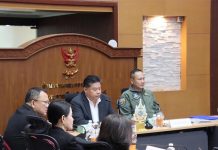Bangkok, 10 June 2013, Several groups of local residents in the southern border provinces have expressed their views and demands concerning the peace dialogue process between the National Security Council and “groups holding different views and ideologies to that of the State.”
They attended a series of brainstorming sessions, organized by the Southern Border Provinces Administrative Center, before the new round of dialogues between the Thai government and BRN (Barisan Revolusi Nasional Coordinate, or the National Revolutionary Front), scheduled for 13 June 2013 in Malaysia.
The Secretary-General of the Southern Border Provinces Administrative Center, Police Colonel Tawee Sodsong, said that the organizing of the brainstorming sessions was intended to open up opportunities for local residents to take part in solving problems in their locality. This would help reduce suspicion and conflicts between officials and local people. More importantly, proposals and recommendations gathered from the forums would be compiled to prepare a peace roadmap for lasting peace in the deep South of Thailand.
In their presentation at a brainstorming session, representatives of students from Prince of Songkla University, Pattani Campus, Yala Rajabhat University, Princess of Naradhiwas University, and Yala Islamic University said that they accepted the role of Malaysia as the facilitator in the dialogues. They stressed the need to listen to the opinions of various groups of Muslim Thais concerning BRN, as well, since they still questioned the acceptance of BRN as representative of local residents in the deep South. Regarding the persons arrested of creating unrest, they were of the opinion that the wrongdoers should face legal action. However, those who are not guilty and have been treated unfairly should be released and receive appropriate compensation. The student representatives also called on BRN to make known clearly its proposed form of administrative system, so that people involved would be able to discuss the issue.
Dr. Ismail Lutfi Japakiya, President of Yala Islamic University, proposed that representatives of the Government in the peace dialogues ask BRN to tell those who have created the unrest to stop violent acts, especially during the month of Ramadan, which is a particularly holy period.
In another session, politicians and members of the Institute of Human Rights and Peace Studies, Mahidol University, and Mahidol University’s Research Center for Peace Building said that the peace process of dialogues should involve all relevant groups and stakeholders, as well as members of the Opposition. They cited injustice as a major cause of southern conflicts and called for the urgent implementation of the Southern Border Provinces Development Policy, 2012-2014.
The policy seeks to eliminate all negative conditions that might be used by perpetrators as a pretext to initiate acts of violence. It attaches great importance to the participation of all sectors of society in the peace-building process. Moreover, the policy also calls for efforts to ease the feelings of social and economic injustice in the deep South and create better understanding about the southern situation among the people in Thailand and in the international community.
The Secretary-General of the Office of the National Security Council, Lieutenant General Paradorn Pattanatabut, said that recommendations from security personnel, educational institutions, and civic organizations, in various forums, were useful for working out the peace roadmap. Lieutenant General Paradon is head of the delegation for the dialogues with BRN. He revealed that talks with BRN on 13 June 2013 would focus on the reduction of the level of violence in the southern border provinces.
The Chairman of the Advisory Council on the Administration and Development of Southern Border Provinces, Dato Aziz Benhawan, who is a member of the delegation in the peace dialogues with BRN, believed that the dialogues would continue and finally lead to the solution to the problems in the deep South.




